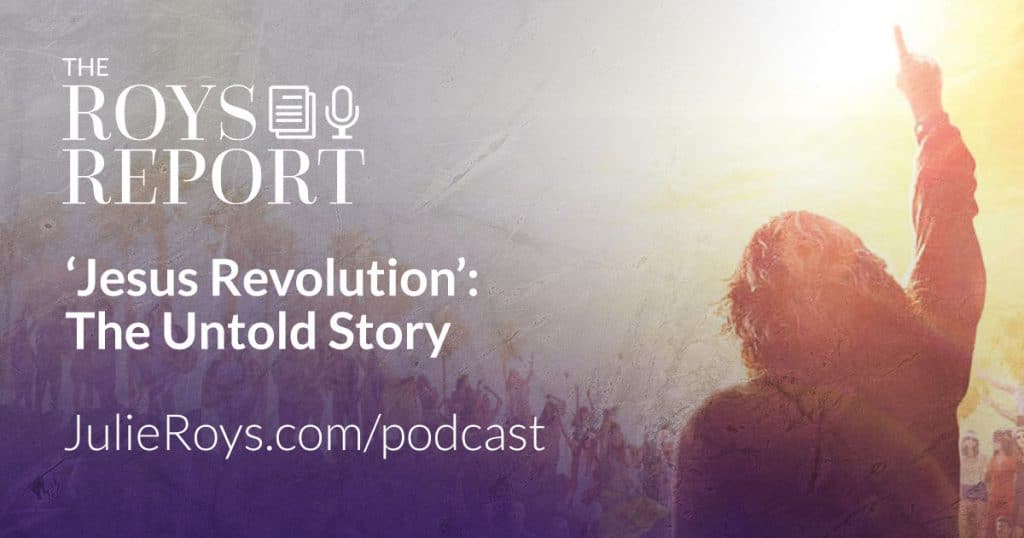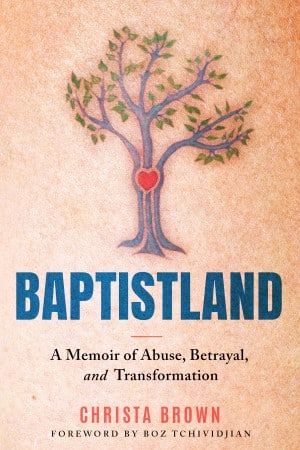If Christians actually believe our beliefs are true, why do so many of the “true stories” we tell in our movies stretch the truth beyond the breaking point?
This has been a big year, not only for faith-based movies but specifically for faith-based films based on true stories. Whether it’s “Jesus Revolution,” “Sound of Freedom,” “Flamin’ Hot,” “Big George Foreman,” “On A Wing and A Prayer,” “The Hill,” or the upcoming “Ordinary Angels,” the vast majority of offerings from the faith-based film industry in 2023 has fallen under the “based on a true story” category. (And that’s not including Bible stories like “His Only Son” and “Journey To Bethlehem,” which Christians, myself included, believe to be true stories as well).
This is not an accident. Christian audiences have long rewarded “based on a true story” movies, from “I Can Only Imagine” to “Breakthrough,” “I Still Believe,” “Miracles From Heaven,” “American Underdog,” “Heaven Is For Real,” “Unplanned” and “Lifemark.”
Kevin Downes, longtime producer of faith-based films and co-founder of Kingdom Story Company (behind such films as “I Can Only Imagine,” “American Underdog” and “Jesus Revolution”) had no problem openly affirming in an interview with Religion Unplugged that the company’s pivot to true story movies was based on the overwhelming positive response its has received over prior work.
“We made a movie called ‘Woodlawn’ a number of years ago … and we just noticed how different it was in telling that true story, how it really connected with the audience,” he said. “And then, our next film after that was ‘I Can Only Imagine,’ which really connected with the audience. So, it was at that point we decided, ‘OK, I think this is where our lane is, this is where God wants us to be, is to be able to tell true stories that showcase the power of the gospel.’”
Your tax-deductible gift helps our journalists report the truth and hold Christian leaders and organizations accountable. Give a gift of $30 or more to The Roys Report this month, and you will receive a copy of “Baptistland: A Memoir of Abuse, Betrayal, and Transformation” by Christa Brown. To donate, click here.
And yet, the uncomfortable problem is so many faith-based true story films turn out to be either totally made up or highly deceptive. The DeVon Franklin-produced “Flamin’ Hot” movie, for example, was immediately hit with credible allegations that the protagonist had made up the fact he had invented the spicy snack.

Former NFL star Michael Oher — the subject of Oscar-winning film “The Blind Side” — recently claimed that the kind evangelical family who had supposedly adopted him never actually did. Instead, he claims the Tuohys tricked him into a conservatorship that allowed them to exploit him and his story financially. It should be noted that the filmmakers at the time were unaware of this alleged scam.
“Jesus Revolution” erased Lonnie Frisbee’s continued homosexuality after being born again and pretended that the Jesus movement of the 1970s led to a resurgence in the Christian faith, when the numbers of Christians in America didn’t even receive a small bump statistically during that time. People who worked for the organization featured in “Sound of Freedom,” Operation Underground Railroad, have alleged that the lead hero made up or exaggerated much of what went on in the film and its anti-trafficking activities since.
To atheists and non-Christians, this wouldn’t be at all a surprise. To many of them, Christianity is based on a lie that claims to be a true story, so it makes sense that Christians would be the type of people that would spread and eat up other fake true stories. But for Christians (like myself) this poses some problems. The Bible is explicitly against lying and repeatedly warns against being deceived.
Asking the tough questions
As I ponder why so many Christian “true story” films turn out to be untrue, it’s worth pointing out that sometimes — in some of these cases, anyway — the allegations of falsehood might themselves be false. Some rightly point out that there is bias against Christians and people who want to hurt Christianity’s reputation. Fair enough. A lot of the criticism of “Sound of Freedom,” for example, was embarrassing in its desperation to paint the movie as evil for being no more deceptive in its portrayal of sex trafficking than your average Hollywood film. In this case, it was largely due to disliking the politics of some of its creators.
Perhaps the allegations against Ballard and Operation Underground Railroad are untrue. Perhaps Oher’s allegations are untrue. Perhaps the allegations against “Flamin’ Hot” are untrue. Perhaps.
That said, not all these movies are so easily dismissed such, as “Jesus Revolution,” whose erasure of Lonnie’s sexual escapades during his ministry and the movement’s short- and long-term failures are a part of an uncontroversial historical record.

And Angel Studio’s own website admits to “creative liberties” with how sex trafficking is portrayed in “Sound of Freedom.”
Likewise, the likelihood that these allegations are all untrue is very small. Most of these movies are made by different studios, Hollywood and non-Hollywood, conservative and liberal, and the allegations are coming from a similarly wide variety of places. Could some allegations turn out to be false?
Sure.
All of them? Most of them?
Not likely. And that still leaves us with enough untrue-true stories to leave us with the same question.
The second thing to acknowledge, of course, is Hollywood fabricates and exaggerates its “true stories” all the time, too. I’ve lost count of the number of articles I’ve read debunking a popular Hollywood film for its historical inaccuracies, from “Braveheart” to “Pocahontas” and many, many more. (Lest we forget, “The Blind Side” and “Flamin’ Hot” were both Hollywood films).
We generally know why Hollywood takes creative liberties with history. It does it to entertain. It does it to make a boring story more exciting or make the people someone the audience can relate to more. Generally, it makes movies people will like and want to buy tickets to see. Since audiences know that Hollywood mostly exists to entertain, if they hear that a film studio lied about history, they mostly shrug it off.
Faith-based films, on the other hand, don’t pitch themselves primarily as attempting to entertain. They claim they’re telling true stories that you can base your life on — just like when Christians preach about Jesus’ death and resurrection. When “Jesus Revolution” shows how Lonnie and Chuck Smith sparked a revival, they’re telling Christians who hunger for revival that this is a historical example to use as a model. When “Sound of Freedom” tells a story about heroes fighting sex trafficking, it’s telling you to donate money and aid them in their cause. When “Flamin’ Hot” tells the story of how a Latino man overcame racism to become a self-made success, it’s claiming to tell you what politics to support.
Truth vs. inspiration
Why do faith-based films often neglect the truth? We might get close to a clue by looking at one word: “inspirational.”
If you hear a word often trumpeted in the faith-based film community, it’s “inspiring,” with the synonyms such as “hopeful” and “hope-filled” thrown in. Christian filmmakers openly and constantly say their goal is to “inspire” audiences. Christian reviewers very often laud these movies as “inspirational.”
Why is inspiration such a big deal among the faith-based film audience? I suspect it’s because inspiration is a huge part of faith. It’s no secret that depression rates have been rising with each generation. Yet, even as the rest of the world gets more and more depressed, the most religious people are often the least depressed. According to a poll by Gallup, as the mental health of everyone in America plummeted during the pandemic, there was only one group whose mental health actually increased: People who attended church each week.
It’s no surprise that Christians would want the same thing they get in church from movies that represent their faith — true stories that made the world seem better than they often felt it was. The problem is, truth is not always inspiring. Sometimes it can be depressing. We want to believe, like “Jesus Revolution” tells us, that if we just allow God to work in us that he will fix the broken parts of ourselves and society.
We want to believe that God’s spirit will win in the end and that our hearts will be changed. We want to believe, like “Sound of Freedom” tells us, that the threats to our children come from “out there” in the world rather than “in here” inside our own families. We don’t want to talk about how most trafficking is perpetrated by family members and loved ones.

We only want to believe the things getting in the way of success are personal and systemic racism. If White people just learned to give opportunities to the marginalized, for example, we would solve all the disparities. That’s why we love stories like “Flamin’ Hot” or “The Blind Side.”
Now many of these beliefs we want to hold on to might still be true. But we have to ask ourselves, if they are so true, why is it we keep finding out that the “true stories” that we tell in order to show they are true keep turning out to be untrue?
Celebrated Christian author Dorothy Sayers wrote about this tension between truth and art in her essay “Toward A Christian Aesthetic.” She argued that Christian art was creative people expressing the truth as they experienced it by living in and observing life, without any conflicting agendas. In her mind, there were two main competing agendas that immediately poisoned art: entertainment and propaganda. Entertainment poisoned truth in art by incentivizing artists to change the truth to make the audience enjoy the art more (as we mentioned with Hollywood). Propaganda poisoned truth in art by incentivizing artists to change the truth to fit whatever beliefs or actions they wanted to inspire in the audience.
I asked Kevin Downes, an actor, producer and director, about the tension of balancing truth and inspiration. He replied this way:
“Yes, that’s a good question. I mean, believe it or not, the stories that we end up choosing to tell, the most extraordinary parts of those stories are actually all true. I mean, sometimes it’s the little fabric and the connective tissue that we have to bring that is not true. But people always ask us, ‘Oh, my goodness, did that really happen?’ And usually it did because that’s what inspires us to want to tell that story within and of itself.”
I have no doubt Kevin is a great guy and that he means what he says. The trouble is, even on that level, the “connective tissue” is often precisely the problem. The connective tissue of Christian films is where they are often the most dishonest. It’s in the connective tissue that they portray the Christian life as one where, as soon as you accept Jesus, He carries you to live the Christian life rather than you working on it with great difficulty. It’s in the connective tissue that the movies minimize how bad sin can get or spend the majority of the movie on the happy moments and rush through the dark ones.
I wrote a review of the movie “Lifemark” in which I criticized the film for portraying a good Christian family without conflict, particularly where the young son goes through some deeply traumatic experiences and doesn’t get angry at the people — God and his family — who put him through that. What was interesting were the reactions from readers. Many, almost all moms, were quick to tell me that such a portrayal of a Christian family was not at all unrealistic and they knew that because their family is just like that and so is their son. They argued that that we needed portrayals of Christian families without conflict to give kids models to inspire them.

Meanwhile, I was getting many supporters, particularly young men, publicly and privately thanking me for saying these things — some of whom wanted to say them but couldn’t publicly because they didn’t want to offend their mothers or people in the faith-based film industry.
This is a quiet tragedy. The dishonesty of Christian films was validating and encouraging a culture in Christian families where young people — particularly young men — had to hide their feelings and experiences to protect the fantasy their families demanded of them. And because they can’t be honest about their feelings, they will probably find a religion — or no faith at all — where they can.
What do we do?
The only way this can change is if Christians start accepting and demanding more truth, even when it makes us uncomfortable.
How do we do that?
First, we have to overcome the lie that movies that tell us truths that we find depressing (or challenge our worldview) will cause us to lose hope or faith. That is, in fact, the exact opposite of the truth. According to sociologist Jonathan Haidt, being exposed to things that scare us and we find challenging or difficult, far from making us worse off emotionally, help build our emotional muscles so that fewer things scare or depress us.
Second, as Christians, we should take comfort that we have all we need to have hope and inspiration. If we believe in Jesus, then we should be capable of bearing all truths — even uncomfortable ones — because our ultimate security rests on none of those things.
There’s a great exchange from a truly good Christian film “Believe Me” between two of the lead characters:
“Did you know that Einstein failed math in school?”
“Yeah, that’s actually not true.”
“Right. But people tell that story to inspire hope.”
“Well those people are stupid because there are actually true stories that are inspiration and also true.”
“Right! But um … uh …”
This moment reminds me that we don’t need to lie in order to inspire. There are truly great and inspiring stories in the world. We can see this truth reflected in the inspiring faith-based movies that are true, such as “On A Wing and A Prayer” or last year’s “Father Stu.”
My prayer for Christians in America (and all people everywhere) is that we become so in love with the truth that we find that inspiring.
This opinion article, which originally appeared at Religion Unplugged, does not necessarily reflect the views of The Roys Report.
Joseph Holmes is an award-nominated filmmaker and culture critic living in New York City. He is co-host of the podcast The Overthinkers, where he discusses art, culture and faith with his fellow overthinkers.
Click below to listen to a recent edition of The Roys Report podcast featuring filmmaker David Di Sabatino:






















32 Responses
How many people believe that certain details in “Chariots of Fire” are true when they are not? The film wasn’t done with an evangelistic purpose – but how many people have referred to these details that weren’t really so to make a point about faith? Can any of you tell us one? I’ll start.
Eric knew quite a while before he was getting on the ship to cross the English Channel that that an event he needed to run in would be on a Sunday. It was more dramatic in the movie to have him find out at that point in the film.
Here’s another: the hurdler that offered to give Eric his spot in the 400 meters because he already had his medal, Lord Lindsay, never existed. He was created in order that Eric would have an alternative to compete in.
Here’s a question for Evangelicals: what faith did Harold Abrahams eventually convert to?
Much of what as been offered here has some merit. It gives me pause, though to read how quickly the author makes blanket assumptions about ‘Jesus Revolution’. The basic core of the story is very accurate in the important points according to some of my friends (including Chuck Girard) who were there and worked extensively in the church with all the characters in this story. You need to know, for example, time frames and detail regarding Lonnie’s ministry and failures before you make pronouncements like that. What happened and when is very important. Perhaps a conversation with Chuck G. might help you there.
As to some sort of supposed minimal effect(!?!) of the ‘Jesus Movement’, I can’t even begin to express how far off the mark that is. I personally have encountered people and places where thousands of people were changed, both in the US and internationally, and sometimes whole regions turned out much better than they would have without the revival called the Jesus Movement.
There were things not in Jesus Revolution that I would have liked to see, and a few things that were emphasized that I thought were unnecessary, (probably because the story was told through Greg’s eyes.)
The Blind Side issue is as yet not indicated as to who is being truthful, and the family is claiming innocence. It would be good to really get their side in detail before throwing it in the pile with the “less than true” stories.
On the whole I think this somewhat good article asking some good questions suffers from a bit too much presumption on a few points.
The Lord bless you.
Greg paid for a film about himself, not Jesus. Need I say more? We are on earth to promote Jesus, not ourselves. Narcissism is an attribute of the Devil, not God.
This was an interesting article however I must dispute this quote, “The Jesus Revolution pretended that the Jesus movement of the 1970’s led to a resurgence in the Christian faith”. I have no idea what data the author accessed but the numbers coming to salvation at Calvary Chapel were real not pretend. I attended from 1970-72 & the church was packed w 100’s of young people every night; we all brought our friends and family to be saved too so it just kept growing. Out of 100’s of believers it was unusual to encounter anyone who had been saved longer than one year. Subsequently people moved and spread the movement to other S.CA cities. Young Calvary believers answered God’s call and planted Calvary Chapels all around the country and grew large congregations. Dear Author how did all these new churches grow and thrive and yet not cause a “resurgence”? Lonnie and Chuck did spark a revival and all the Calvary Chapels are the proof of it so why shouldn’t it be used as a historical model for today?
Also Greg Laurie does not try to hide Lonnie Frisbee’s homosexuality but why should it be part of the movie as the movie is portraying Greg’s story not Lonnie’s.
Because the growth of a successful church or network of churches is typically at the expense of other churches in the vicinity. Odds are that the vast majority of people who attended Calvary Chapel in the early days were transplants from other local churches. This is not a controversial statement. It happens all the time.
Older surveys of church attendance are sparse, but what evidence that is available shows no sign of a national resurgence in faith or church attendance during the 1970s, with a slow and steady decline throughout the decade. If there was any significant spike, it must have been very short lived, which would call into question how real those conversions were.
The truth is there was no national revival in the 1970s. Local revivals do happen, but they do change the fact that nationally, they do nothing to move the needle.
Faith is simple to understand. Truth less so. Both are absolutely subjective. Each tends to imply a transcendence of subjectivity. Both are crucial to being Earth-bound human beings.
A crucial current crisis in collective and global human occurrence, is that the faith of individuals and communities, can and does evolve to a sense of truth, where those truths can and do sometimes so conflict, that individuals and communities can yield to an impulse to destroy individuals and communities who do not share their sense of truth.
Media, of all sorts, oral and material, then interact with this nexus of faith and truth and potential conflict. The Bible and moving pictures being two such material mediums.
In the instance of both mediums, the issue of the relation between audience and faith and truth and more, arises. The idea of connective tissue then usefully capturing the central matter of communicating. Each material medium involving its own issues of compromising belief/faith and truth, in the interest of communicating.
Arguably, that the medium is always the message (the primary effector of the audience), entails that perfect or even good translation between the Bible and moving pictures, is well nigh impossible. The faith and truth mediated by the one, always differing from the faith and truth mediated by the other. One set of generations more exclusively mediated by the written word Bible, another set of generations more mediated by moving pictures and other associated material mediums.
There were two books that influenced my faith greatly in the 1980s. One was “The Satan Seller” by Mike Warnke; the other was “Forgive me Natasha”, by a Soviet defector who became a Christian. In both cases the stories were exaggerated and sometimes absolutely false. Both books were bestsellers and part of the Church industrial complex.
As a result of this deception, I automatically doubt any “amazing” story that makes its way into church culture. This include stories of amazing miracles or revivals, but also include any negative news about unbelievers, such as stories about homosexuals, transgender, neo-pagans and so on. I just automatically disbelieve the information that goes through Church communities.
I remember reading the Satan Seller and listening to Warnke’s tapes and being shocked by his story and later was shocked even more after Cornerstone Magazine did and expose of him.
Perhaps in addition to wanting to make the movie ‘inspiring’ there’s the belief that if the movie is also ‘true’ to the story that it’s going to be boring.
That is the trivial truth of the matter. It happens every Sunday morning in church too. When a pastor tells a story that has people horrified, or joyful, or weeping, or rolling in the aisles, what are the odds they haven’t embellished it in some way? Almost zero. People’s lives just aren’t that interesting!
But embellish is what good storytellers do, and I’m sure everyone has done it. I certainly have, whether it’s for brevity, or to make the story more interesting, or even because I can’t remember all the details anymore.
To paraphrase J.R.R. Tolkien, tales often grow in the telling. People naturally vary their recounting of events, and are prone to keeping the versions that get the best reactions It’s well know that if you tell one version of the story often enough, you can easily come to believe that it is the most accurate one, even if it’s clear to others that it isn’t.
Several times in my life I’ve told a story about my childhood to my parents, and they completely contradicted my version of events. I had no reason to doubt them, but to me, my version felt like the honest truth.
“Embellishing” the truth is lying. the fact that pastors regularly do it doesn’t make it ok, it shines a light on some of the other troubles we read about here on the regular. If pastors are willing to lie to get a laugh (or tear), where else are they willing to compromise. OF COURSE christian filmmakers are wiling to lie to tell a more interesting story. the “fruit” of the white american evangelical church is rotten- why would we expect anything different from people trying to turn faith into a profit? All of it is gross, and making excuses for why it’s ok is super gross.
Sounded ok until “white american evagelical”… since we all know that all problems come from there. Pre -packaged prejudice. Do better.
the white american evangelical church is the church that I was raised in, know, and see pretty clearly what the problems are. I don’t know the Black evangelical church, mainline churches or the Catholic church well enough to diagnose their issues, and I’m focused on correcting my own, not throwing stones at others. so yes- the white american evangelical church is specifically what I’m talking about- they are my people and they need to be called out.
Faith-based films, on the other hand, don’t pitch themselves primarily as attempting to entertain. They claim they’re telling true stories that you can base your life on — just like when Christians preach about Jesus’ death and resurrection. When “Jesus Revolution” shows how Lonnie and Chuck Smith sparked a revival, they’re telling Christians who hunger for revival that this is a historical example to use as a model. When “Sound of Freedom” tells a story about heroes fighting sex trafficking, it’s telling you to donate money and aid them in their cause. When “Flamin’ Hot” tells the story of how a Latino man overcame racism to become a self-made success, it’s claiming to tell you what politics to support.
The above is taken directly out of the article of this post. I think it’s more than unfair that the writer of this article makes his assumptions based on what he thinks and feels, at least this is my understanding of what he is saying. Example: “when Jesus Revolution”, “when sound of freedom”, “when flaming hot”. How does Mr. Holmes know this? I don’t believe he does. I believe that for whatever reasons he chooses he’s got nothing better to do than to criticize something he doesn’t fully understand. I’m not saying that what he’s writing about doesn’t have some ring of truth to it in some cases. What I’m saying is, to me, he appears to be lumping faith-based movies together and leveling criticisms that he thinks are legitimate but he doesn’t provide proof. Opinions are like armpits. We all have them and they all stink! And at the beginning of this article that’s what it says it is, an opinion.
George, I guess you’re saying it’s true…the truth is subjective, because why tell the “real” truth? It’s soo boring!
I think Russell Moore was told the same thing and we all see how he responded to that!
This is not how most atheists think. Most atheists don’t believe Christians are the “type of people” who lie and make up stories because their faith “is based on a lie”. That’s silly.
Atheists simply believe that Christians are just as flawed as everyone else — i.e. just as likely to be motivated to lying and bending the truth when it suits their needs, whether it’s to promote a “based on a true story” movie or something else.
Now they might hold Christians to a higher standard than other people, and hence level more opprobrium at them when they fall short, but is that a bad thing? Shouldn’t Christians hold themselves to a higher standard anyway? Salt and light?
“Tuohys tricked him into a conservatorship that allowed them to exploit him and his story financially. It should be noted that the filmmakers at the time were unaware of this alleged scam.” From what I have seen and read and has been claimed in previous communication by Oher is that he knew that he hadn’t been adopted and in fact was a “conservatorship.” It seems to me the jury is still out on this and so to refer to it as an “alleged scam” might be also be “bearing false witness” until we know more. It appears to me that Tuohys sought to help a young man in trouble and would not have known at that time that the NFL would even be on the radar. I think we need to be fair in our reporting or else one is doing the same thing that they are accusing others.
Filmmaking sometimes has to compress time and combine characters to make the film “cinematic”. Often a bit of action is added to liven things up or use antagonists to support the movement forward of a character. I agree that outright lying is hypocritical, but one can use the disclaimer, “Based on actual events”. Moviemaking is a business and if you do not attract audiences then you have no business. I also do not believe film is the correct medium for evangelizing.
so, it sounds like you’re saying that christians who lie to make a profit are ok, because it’s a business?
JM,
“so, it sounds like you’re saying that christians who lie to make a profit are ok, because it’s a business?”
I interpreted his comment a bit differently.
Vance wrote:
” I agree that outright lying is hypocritical, but one can use the disclaimer, “Based on actual events””
To me it reads that he is exposing how “Christians”/Hollywood validate their use of lies in “true” films (to make money) and how they can claim “we placed a disclaimer, and you chose to pay for/support the programming”. We have free will given to us, by God. Evil has to get our consent, and with a disclaimer posted before the film, it places the responsibility on us to use our discernment, not to support it, or the evil supplying a product for consumption.
Interesting article which resonates. Was just talking with my wife today about the inconvenient truths of persecution and the losses experienced while serving long term overseas. The stories we have to share are a mix of perseverance, Gods intervention, exhaustion and failure. All rolled together. However being honest about it isn’t often well received by our US partners because it’s “not positive enough”. Perhaps many church goers have been fed a steady diet of too many embellished stories?
I like feeling good like everyone else. But Successes and winning moments don’t equal happily ever after – life isn’t a fairy tale. We are told the truth sets us free. We need to remember that means the whole truth, not just parts of it.
Strange. I thought they lapped up stories of persecution?
When I go to a movie “based on a true story”, I understand I’m not going to see a news report. I’m there to enjoy a good story. Nobody ever cites a movie as a reference in a research paper and most people (I hope) intuitively understand the difference in genre.
sure. but Christians shouldn’t lie. even to make movies. maybe movies aren’t the medium for christians to tell their stories if it requires them to lie to make it entertaining?
If I tell you I’m going to tell you a story based on something that actually happened, I’m truthfully telling you to expect a blend of fact and fiction. If I’m claiming a story is literally true, you expect something different. It’s not appropriate to describe fiction as deception when I told you to expect it.
christians shouldn’t lie. if you’re taking a “story based on something that actually happened” and adding to it, that’s lying because you’re misrepresenting truth. if you’re making something up wholly- that’s fiction and allowable. this whole article is about people literally lying in Jesus name, to make whatever story they’re trying to tell more compelling rather than just telling the truth.
and the comments are FULL of people justifying why it’s ok for christians to lie. it’s gross.
JM,
“and the comments are FULL of people justifying why it’s ok for christians to lie. it’s gross.” Agreed, and full of hypocrisy, since they demand non/new believers live a standard that they do not hold themselves to.
That is what has being taught every week at services for decades. That the “leaders” have a special exemption/status because they have been chosen to be pastors and their behavior/service fall under a different set of rules.
Try to bring a scriptural rebuttal from MMLJ, and they use the Romans 13 argument skipping:
4 For he is the minister of God to thee for good. But if thou do that which is evil, be afraid; for he beareth not the sword in vain: for he is the minister of God, a revenger to execute wrath upon him that doeth evil.
9 “… Thou shalt not bear false witness …”.
13 Let us walk honestly, as in the day; not in rioting and drunkenness, not in chambering and wantonness, not in strife and envying.
I have seen “End of the Spear”, “I Can Only Imagine” and “Jesus Revolution “. When I watch these “faith based movies” I try to view them as a nonbeliever and see if the Gospel message is clearly presented, there is no Gospel in these movies. So what’s the point? Faith based movies are for profit enterprises to give Christians the warm fuzzies.
Or they are to start conversations. I’ve seen a couple of faith-based movies with non-believing friends and it opened the door to good conversations about what I believe, how that influences my life, and why. That led to their interest in a Bible study, eventually visiting my church….it was a start of their journey into a relationship with the Lord.
I know we’d love to just put unbelievers in front of a Christian movie and “ta-da!” they get saved; but these movies are tools. Yes, they provide clean entertainment and inspiration TO us, but they aren’t to do all the work FOR us.
Have you considered sharing what parts of God’s love are evident in these films? Or talk about “what I wish the film would have gotten into is…” (this is a great way to talk about the gospel more directly)?
I’m not sure if all good dogs go to heaven — even if Santa Claus said it ⁉️
However, I do find it disgusting to consider Christians are only of the white race and one political party. Now this article,
“John H. Glenn: An Astronaut and His Faith”
https://www.christianitytoday.com/ct/1962/march-16/news-john-h-glenn-astronaut-and-his-faith.html
came out way before the movie, “Hidden Figures” the movie about the Black women mathematicians that help make our space program a success, showed that John Glenn was the only astronaut to go out of his way to shake hands with them‼️
John Glenn was neither an Evangelical or a Republican but he certainly practiced Christianity as that movie showed.
Very interesting article. I don’t go into any movie that is “inspired by a true story” expecting to get documentary-style reporting (even documentaries have angles). I expect to get a fictionalized account of a story designed to shed light on an event or idea.
I respect that filmmakers are tasked with something quite tricky – to take a real event and make it compelling in a very short time frame. If we stop and think of our day-to-day lives, whittling every conversation, interaction, relationship, thought and moment from the last WEEK down to a 2 hour story isn’t easy – and in the case of films, they often have to consider time frames spanning YEARS across multiple characters.
So I understand “movie making tricks” like creating characters to represent a collection of relationships, interactions, or conflicts to condense it all down and move the plot forward.
That is a FAR cry from telling a false story altogether. Just as there are journalism standards, there should be artistic standards that determine when one can claim a film is “based on” or “inspired by” a true story.
The answer CAN seem simple: just remove the “based on/inspired by” label. However, while this can give a filmmaker more creative license, it can also expose them to significant legal risk. We read of this happening even over fictional scripts: if a plot resembles another’s idea or event, film studios and writers are sued for theft, plagiarism or not giving proper credit. I’d be interested in knowing the legal definitions and precedent here.
And I don’t think they should differ for a Christian or non-Christian film.
If churches taught critical thinking skills, most of these so-called inspirational movies would go largely unnoticed and unattended. The Jesus Revolution is a prime example. I see people praying and wishing for the same kind of revival. So I guess that means we need an LGBT person to show us the way. My friends at church would be aghast if they knew the truth about Lonnie.